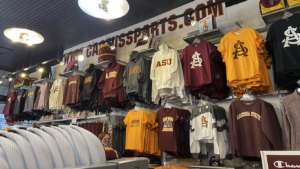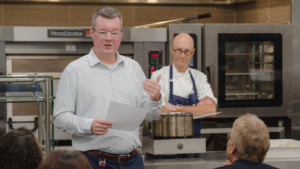In order to endure the financial hardships of our time, a local business owner fused a business savvy mentality with creative problem solving to survive during the collapse of an industry.
Cindy Dach, 48, owner and general manager at Changing Hands Bookstore, says that it is the ability for a local business to be nimble that gives them the advantage necessary to adapt to the changing economy.
Barnes & Noble have made headlines this month with a $34.9 million reported loss, causing a 30 percent drop in their stock. Though it has slowly crept up, many fear for the future of the company. Despite the dismal predicament corporate bookstores find themselves in, the independent bookstores miraculously are thriving.
“We can change the policy and we don’t have to worry about big losses with investments,” Dach said. “A corporate store has to bounce everything back to their corporate headquarters and that is a problem. Changes in policy cost them millions . Our ideas don’t have a large impact when we are trying stuff out.“
In order to reinvent the bookstore, Dach understood that books brought in a low profit margin. In order to increase revenue she adopted a business model that she refers to as “bookstore 2.0”.
“I noticed that when we would have author events the bar next door would have amazing nights in sales and I began to think: That’s my money!” Dach said.
She introduced the idea of having a cafe and bar within the establishment to her co-owners, Bob Sommer and Gayle Shanks, after visiting Kramerbooks and Afterwords Cafe in Washington DC.
“The fact that they had incorporated a coffee/wine/beer bar into the store made the draw irresistible,” Mike McCullough, a regular patron, said. “Independent businesses offer a level of service and attention to detail a corporation simply can not match.”
Part of the success of independent bookstores like Changing Hands is the growing popularity among the younger generation’s interest in the local movement.
“When you come to a bookstore to get a book, you help your community and you get to interact with people who care,” Rebecca Brisley, an employee at Changing Hands, said.
Dach attributes the younger generations for the success of their second store, being more active to seek out socially responsible business to support.
“It matters to them and they understand where things come from and the money spent to make it or the harm it causes” Dach said. “So there is this raised consciousness which I really love about this next generation.”
When Changing Hands opened, it was a two-person operation with a vision to open a used bookstore. The logo changed many times, but the motif of hands remained consistent. The idea behind it all was that books often change hands. Dach said she believes it wasn’t until they began doing author events that the company fully established their brand.
Changing Hands’ success hasn’t come without it’s woes, however.
“The bigger you get, the more you notice the haters, because all of the sudden you are the popular kid. Which is why I think it’s important to be empathetic.” Dach said. “Our biggest challenge is Amazon. It’s hard when your largest competitor makes money in so many ways that books for them is a lost cause where as for us it’s our livelihood.”
With a bachelor’s degree in marketing and a masters of fine arts in creative writing, Dach never thought she would actually be in a position where she would be living her dream.
“I am a big believer in working harder until you can work smarter.” Dach said.
With 40 years under its belt and its second store, steadily increasing its business with new events, Changing Hands is a true testament that, sometimes, bigger isn’t always better.



